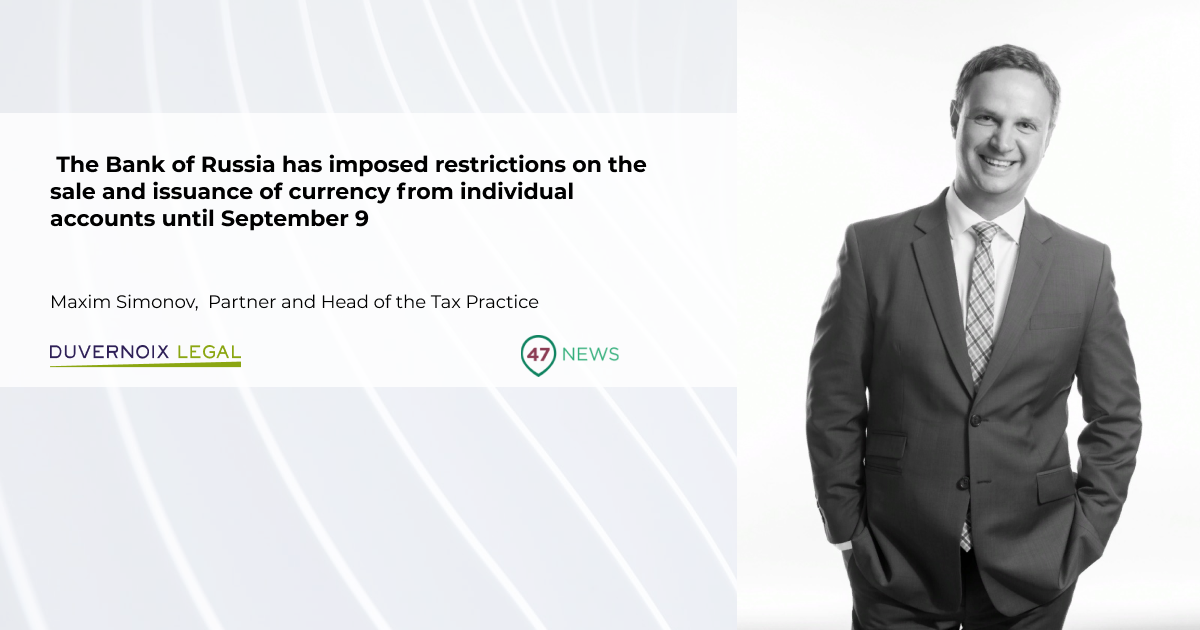The Bank of Russia has imposed restrictions on the sale and issuance of currency from individual accounts until September 9
Since March 9, the Bank of Russia has imposed restrictions on the sale and issuance of currency from the accounts of individuals for a period up to September 9.

Together with Maxim Simonov, Partner and Head of Tax Practice of the Duvernoix Legal law firm, 47news reflected on the return of the seemingly forgotten black market, and about how to live on in general.
- So, citizens are prohibited from buying currency…
- In order not to frighten people at all, I will clarify: it applies for cash only. No one prevents a citizen from converting rubles into currency at the bank where these rubles are kept, and then receive it at the cash desk of the same bank. Simply put, the exchangers are closed until September 9. No restrictions were imposed on the banking operations of individuals with foreign currency.
- But cash withdrawals in the bank should not exceed $10,000 for six months of restrictions imposed.
- Yes. This is the limit in every bank where a citizen has a foreign currency account. It's worth clarifying here, since it seems that not everyone has understood: you can withdraw money only in dollars, in whatever currency they are stored. The amount exceeding $10,000 will have to be withdrawn in rubles.
- That is, the state forces us to convert everything into dollars. Why?
- I think, firstly, the amount of dollars in Russian banks and the state reserve exceeds the amount of euro. Secondly, I assume that it seems advantageous for the Central Bank to get rid of dollars from the point of view of the currency balance. Apparently, the forecasts of curbing the ruble’s fall imply deprecation of dollars – for this there should be as many of them as possible in free circulation on the market.
Sberbank shows a magical example of a policy aimed at saving the euro. On March 9, at a dollar exchange rate of almost 106 rubles, by the evening the bank was selling it for a little more than 141 rubles. At the same time, the euro purchase rate of the bank was about 122 rubles that day. Suppose you have 1,000 euro stored in your account, you want to obtain them, but after the Central Bank's order, you can only receive dollars. Accordingly, the bank will exchange 1000 euro for 122,000 rubles, for which you will be able to purchase only 865 dollars.
- Apparently, there will be people who will need more cash than $10,000, and who will not be stopped by bans…
- Of course. In such a situation, a black market is likely to appear.
- Is it punishable? It seems that changes have not yet been introduced into the Criminal Code…
- They haven’t. The punishment for violating the ban on the sale of cash currency in this case is provided for by the Code of Administrative Offenses (Article 15.25 "Violation of the currency legislation of the Russian Federation and acts of currency regulatory authorities"). This is a fine from 75 to 100% of the value of an illegal transaction if you are caught at the time of its commission.
Then the journalist realized that this norm existed and no one had ever even thought about it. Our legislators are indeed provident.
- This is a police story.
- Well, yes. With all the ensuing consequences – the participants of the transaction will be detained, the money will be withdrawn, a protocol on an administrative offense will be drawn up and the material will be sent to the magistrate's court, which will make a decision on the fine. But do not forget about the possible options for the development of such situations. First of all, the black market is a black market. You may be given fake dollars, and in this case you will not even be able to complain to the police. Secondly, you will probably decide to do something with the purchased currency. For example, to buy an apartment, a car, or something else substantial. Even before the special operation, banks refused to accept large sums of money without documentary confirmation of the legality of their origin. Now this will be treated even more carefully – the currency in particular. Not only the banks will not accept cash currency from you, but will also inform Rosfinmonitoring, after which you will have an unpleasant explanation with the tax inspector about the origin of the currency in such quantity at such a time.
